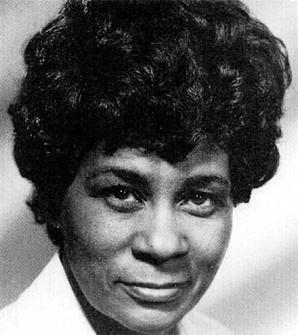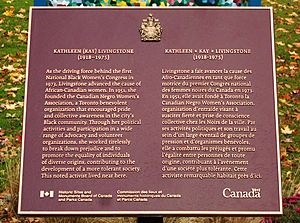Kay Livingstone facts for kids
Kathleen "Kay" Livingstone (born October 13, 1919 – died 1975) was a very important Canadian. She was a social activist, an actor, and a radio host. A social activist is someone who works hard to make society better for everyone. In 1973, because of her efforts, the first National Congress of Black Women of Canada was formed. This group helps support and empower Black women across Canada.
Contents
Early life and family
Kay Livingstone was born Kathleen Jenkins in London, Ontario. Her parents, James and Christina Jenkins, were also very active in their community. Her father was an assistant judge, and her parents started a newspaper called Dawn of Tomorrow. This newspaper was created for the Black community. Kay grew up in a family that was already making a difference. Her parents, James and Christina Jenkins, were very active in their community. Her father was an assistant judge, helping young people in the local court. Together, her parents started a newspaper called The Dawn of Tomorrow, which was a special publication created for the Black community. Imagine having parents who ran a newspaper! This early exposure to community work and communication likely inspired Kay from a young age.
After her father passed away in 1931, her mother remarried Frank Howson. This meant Kay had a half-brother, Barry Howson, who would later become a Canadian Olympic athlete! It seems a spirit of achievement ran in her family.
Education and early career
Kay was also very talented in the arts. She studied music at the prestigious Royal Conservatory of Music in Toronto, Ontario, and also learned elocution (which is the art of clear and expressive speaking) at the Ottawa College of Music. These skills would become very important in her future career as a broadcaster and actor.
During World War II, a time when many Canadians were working hard to support the country, Kay worked for the Dominion Bureau of Statistics in Ottawa, Ontario. This government office collected and organized important information about Canada.
A Voice on the Airwaves: Broadcasting Career
With her excellent speaking skills, it's no surprise that Kay became a successful broadcaster. While living in Ottawa, she hosted her very own radio program, The Kathleen Livingstone Show. Think about that – having your own radio show back then was a big deal!
When her family moved to Toronto, she continued her radio career, hosting shows for several stations, including one that was connected to the famous CBC (Canadian Broadcasting Corporation). Through her radio programs, Kay could reach many people, sharing ideas and connecting communities.
Founding the Canadian Negro Women's Association
In 1951, Kay Livingstone started a social club in Toronto. It was first called The Dilettantes. Soon after, it was renamed the Canadian Negro Women’s Club. Later, it became known as the Canadian Negro Women’s Association (CANEWA). Kay Livingstone was the first president of CANEWA, serving from 1951 to 1953.
CANEWA did many important things. One of their main goals was to help Black students stay in school. They did this by offering scholarships. CANEWA also organized the Calypso Carnival, which later grew into the famous Caribana festival. Caribana is a large annual festival that celebrates Caribbean culture in Toronto.
Acting and Community Leadership
Kay Livingstone was also a talented actor. She performed in both amateur and professional plays. People at the time called her "one of Canada’s leading Black actresses."
Beyond her acting and radio work, Kay Livingstone held many leadership roles. She was president of the United Nations Association in Canada, which promotes the goals of the United Nations in Canada. She also served as a regional chair for the National Black Coalition. This group worked to improve the lives of Black Canadians. She was also a moderator for Heritage Ontario and a member of the Appeal Board of Legal Aid. Legal Aid helps people who cannot afford a lawyer get legal help.
Just before she passed away suddenly in 1975, Kay Livingstone was working as a consultant for the Canadian Privy Council. The Privy Council advises the King or Queen on important matters. She was helping to organize a big meeting for women from visible minority groups. Kay Livingstone is known for being the first person to use the term "visible minority" in Canada. This term refers to people who are not Indigenous and are not white.
Personal life
In 1942, she married George Livingstone, and they had five children.
Kay Livingstone's Lasting Legacy
Even though Kay Livingstone passed away in 1975, her work and spirit continue to inspire people today.
- After Livingstone's death, a friend named Carrie Best formed The Kay Livingstone Visible Minority Women's Society to continue Kay's work.
- The Kay Livingstone Award is given to Black women in Canada who work to improve the lives of other women of colour and their families. It's a wonderful way to honor Kay's dedication to helping others.
- In 2011, the Canadian government officially recognized Kay Livingstone as a "Person of National Historic Significance." This means her life and contributions were so important that they are considered a key part of Canada's history. A special plaque was put up near her Toronto home in 2017 to mark this honor.
- In November 2017, Canada's postal service announced that Kay Livingstone would appear on a postage stamp in 2018. This was part of a series celebrating Black History Month in February. The stamp was officially issued on February 1, 2018, in her birthplace of London, Ontario. Imagine sending a letter with Kay Livingstone's face on it!
 | Victor J. Glover |
 | Yvonne Cagle |
 | Jeanette Epps |
 | Bernard A. Harris Jr. |



